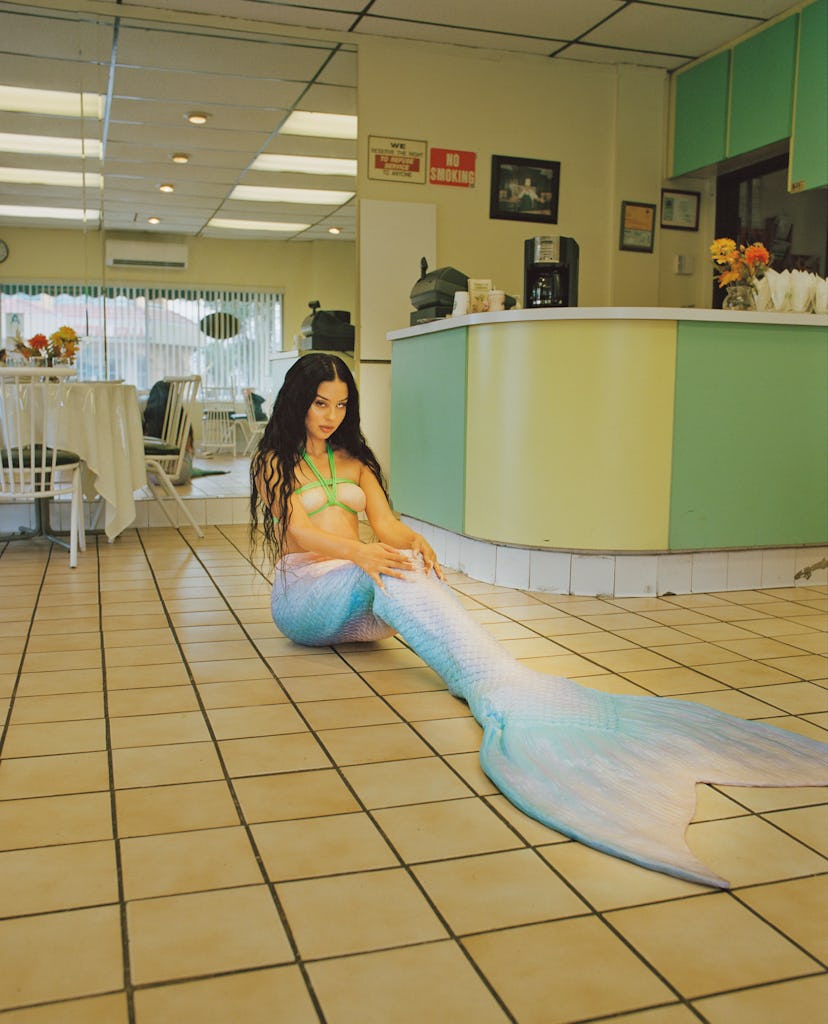Petra Collins and Alexa Demie Play Out Their Fantasies and Traumas in Fairy Tales

As a child, the artist Petra Collins and her sister Anna conjured fairy tale worlds where they could escape from reality, live out their dreams, and play within their deepest fantasies.
“I lived in two different worlds: our world, and then a full other fantasy world,” Collins tells me from her bedroom in Los Angeles over Zoom on a recent afternoon. “It was the best way of disassociating—making these beautiful worlds.”
Playing pretend is by no means a novel aspect of childhood—but Collins has taken that ethos and made a buzzy career out of it. In just seven years, the Toronto native has established her own uniquely hazy, female-gaze-centric aesthetic; become both muse and protégé to photographer Ryan McGinley; shot countless magazine covers; hosted exhibitions at MoMA and Art Basel, and directed short films and music videos for the likes of Cardi B and Olivia Rodrigo. (Her Good 4 U music video for the 18-year-old singer was most recently nominated for a Grammy—Rodrigo FaceTimed Collins during this very interview to congratulate her.)
Collins’s latest project, a photography book made with the Euphoria star Alexa Demie called Fairy Tales, is something of a tribute to the escapism that has become a cornerstone of her work. The project, which will be published by Rizzoli on November 30th, features imagery that encapsulates the daydreams and whimsy of both Collins’s and Demie’s fancies and is broken into nine visual stories in which Demie transforms into a fairy, a banshee, a troll, a mermaid. Sporting elf ears and painted bodysuits, the actress occupies foggy, fantastical spaces that toe the line between dreams and waking life. One moment, she’s a long-haired siren in a strip club; the next, she becomes a water fairy playing with goo in a hospital.
The latter character is labeled in the book as a “viz tunder”—the Hungarian name for this particular kind of sprite. Collins was raised on a diet of Hungarian folktales: stories that she describes as “super psychedelic, so sexual, and violent.” She points to one tale in which a girl trades her body for goats, then raises her skirt to reveal a blinding light as a euphemism for her vagina. “This is seared into my memory, and I didn’t realize it was such a big reference until years and years later,” Collins says.
While she watched cartoons with her sister, her real life played out in the background—a childhood that the artist describes as being marked by fear and anxiety growing up in “a household with trauma.” “Throughout my career, I’ve tried to figure out the fairest way to discuss it,” she adds. “That’s obviously a huge factor in my work.” And although both Demie and Collins created Fairy Tales out of a place of happiness, fun, and playfulness, trauma does factor prominently into the narrative. (“We took all our fantasies, our traumas, the things we lust after, and the tales we told ourselves and put them in this book,” a note from the two authors reads on the first page of Fairy Tales.)
“There were obviously our own overarching personal traumas—I was going through a breakup from an abusive relationship and was thinking about how my childhood affected my choice of lovers and breaking that pattern—but then there was this thing where, as a whole society, we experienced a collective trauma,” Collins explains, referring to the pandemic. “There was a need for escape, obviously, but there was also a need for a truer reflection of reality.” The artist found the reigning style of pandemic-era photography to be disparaging. “It felt like the furthest thing from reality,” she says. “There was no life in it.” As a result, Fairy Tales—a book that, at face value, seems otherworldly and fictional—echoes an alternative view of the moment: “The photos are the closest thing to documentary style I could take,” Collins says.
Bondage plays a prominent role in the pages of Fairy Tales. Demie’s wrists are tied with pink rope, or her entire body is bound in a makeshift harness, hanging from the ceiling in a young girl’s bedroom. “A big thing about bondage is controlling discomfort or controlling a strong feeling,” Collins notes. “And it’s visually interesting; it’s fun when the subject is having fun with it and is in a position of power with it.” It’s an intriguing metaphor for Demie, whom Collins first met through “my friend Barbie [Ferreira]—I think I saw her via Instagram,” she says. “For women [of color] like [Demie], she’s put in a very, very specific role, as this angry, ‘spicy’ girl,” Collins says. “People are so typecast, it’s insane. But while shooting her for the book, it was cool to see her range and see that she can obviously do what the fuck ever.”
The Hispanic folklore Demie heard as a child differs slightly from those of Collins’s upbringing—the actress’ grandmother used to tell her stories of fairies and puckish creatures in Spanish. But according to Collins, the feeling of creating an escape and a happy place was all the same.
“I think that’s what we are really missing right now,” Collins says. “Not to use therapy talk, but I feel like a lot of us need to nurture our inner children, who have probably been so frightened by this experience. A book like this is really fun for both your adult and child self.”